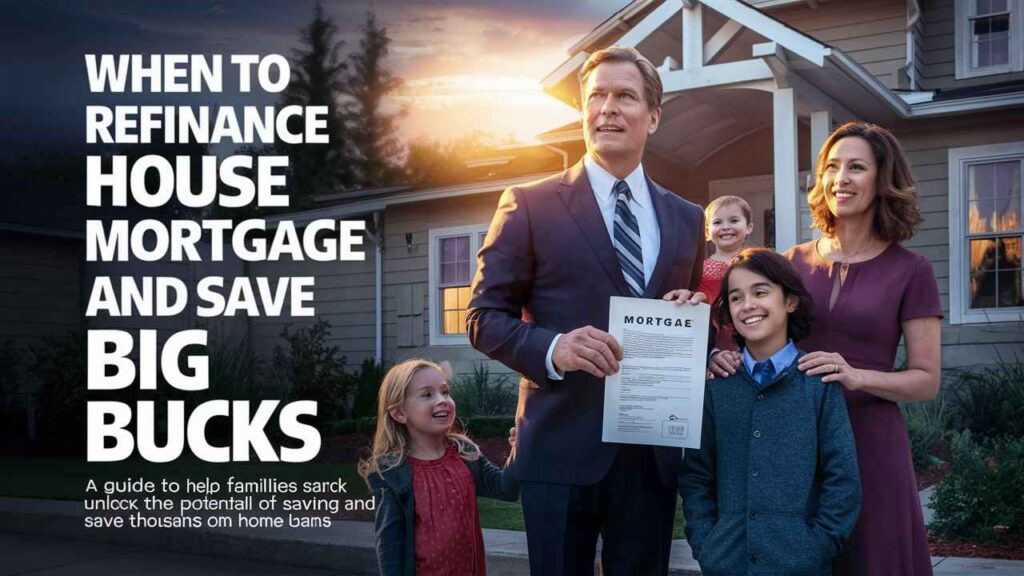The Million-Dollar Question – Is Now the Time?
Imagine sitting in your favorite armchair, sipping on a cup of coffee while contemplating the labyrinth of mortgage options. Your mind wanders: “Is now the time to Refinance House Mortgage?” Well, buckle up, because we’re about to embark on a rollercoaster ride through the ins and outs of refinancing. This isn’t just a financial maneuver; it’s a strategic play that could lead to significant savings🏠like finding a $20 bill in the pocket of your winter coat. So, let’s unravel this conundrum and discover if now is the golden moment for you.

Why Timing is Everything: How Refinancing Works
Refinancing a mortgage is akin to hitting the refresh button on your financial journey. It’s not just about changing the interest rate; it’s about recalibrating your financial compass. Picture this: you have a mortgage with a sky-high interest rate that’s making your wallet weep. Refinancing allows you to replace that old loan with a new one, ideally at a lower interest rate. But timing is of the essence🏠interest rates fluctuate more than your favorite reality show’s plot twists. The trick is to recognize the opportune moment, ideally when rates dip lower than a limbo dancer at a beach party.
The Magical Mortgage Clock: When Does It Make Sense?
Not all moments are created equal when it comes to refinance a mortgage. The magical mortgage clock ticks differently for everyone. Generally, refinancing makes sense if you can lower your interest rate by at least half a percent, or if you wish to change your loan term to a shorter duration. But keep your eyes peeled for those signs that shout, “Time to refinance!” This includes life changes like a new job, marriage, or having a child🏠essentially, if your life feels like an episode of “Survivor,” you might want to reconsider your mortgage strategy.

The Interest Rate Temptation: Is It Low Enough Yet?
Ah, the siren call of low-interest rates! They lure homeowners with promises of lower monthly payments and increased savings. But how low is low enough? The golden rule is to keep an eagle eye on the market. When rates plummet like a rogue skydiver, it’s time to get excited. A lower interest rate can save you thousands over the life of your loan. However, don’t forget to consider other factors, like how long you plan to stay in your home and the overall economic climate. Just because rates are low doesn’t mean you should dive in headfirst without a flotation device.🏠
The Break-Even Point: When Will You See the Big Bucks?
Ah, the mystical break-even point! This is the magical number of months it takes for your refinancing costs to be outweighed by your savings. To find this number, simply divide your total refinancing costs by your monthly savings. If it takes you three years to break even, but you plan on living in your home for only two years, you might be better off saving your pennies for a rainy day. Knowing your break-even point can turn a potentially reckless decision into a savvy financial strategy.

Equity 101: What You Need to Know Before Refinancing
Equity, dear reader, is not just a buzzword tossed around by financial gurus🏠it’s the amount of your home you truly own. Before you dive into the refinancing pool, check your equity. Generally, lenders prefer you to have at least 20% equity in your home to avoid private mortgage insurance (PMI). This is especially crucial if you’re considering a cash-out refinance. A healthy equity percentage can lead to more favorable loan terms and lower interest rates. So, make sure you know how much of your castle you own before you start making mortgage moves!
Credit Score Power-Up: Why Your FICO Score Is Your Secret Weapon
Your FICO score is like a superhero cape for your finances🏠it gives you the power to secure better mortgage terms. Lenders use this magical number to determine how risky you are as a borrower. If your score is looking a little lackluster, consider improving it before you refinance a mortgage. Pay down debts, avoid new credit inquiries, and check for errors on your credit report. A few small tweaks can transform your score from “meh” to “magnificent,” giving you access to lower interest rates and better loan terms.

Fixed vs. Adjustable Rate Mortgages: Which One Deserves a Second Chance?
When it comes to mortgage types, fixed and adjustable rate mortgages (ARMs) are the classic rivals, like Batman and the Joker. Fixed-rate mortgages provide stability, while ARMs offer tantalizingly low initial rates that can change over time. If you’re considering refinancing, weigh the pros and cons of each. If you plan to stay in your home long-term, a fixed-rate mortgage may be your best bet. However, if you love the idea of lower initial payments and aren’t afraid of a little risk, an ARM could be your sidekick in financial freedom.
Are You Planning to Move Soon? Stop and Reconsider!
If you’re itching to pack your bags and head to a new abode, hold your horses! Refinancing when you plan to move soon can be a financial faux pas. The costs associated with refinancing might outweigh the benefits if you’re only going to be in your home for a short while. You wouldn’t buy a pair of shoes for a single party, right? Consider your timeline carefully before making any hasty decisions🏠especially when your new digs could be just around the corner.

The Hidden Costs of Refinancing: What the Bank Won’t Tell You
Ah, the elusive hidden costs! Just like finding out your favorite TV show is being canceled, these expenses can hit hard. Refinancing isn’t free; it comes with various costs, such as application fees, appraisal fees, and title insurance. It’s crucial to account for these costs when calculating your potential savings. Remember, banks might be smiling at you, but they’re not always transparent about their fees. Take the time to read the fine print and ensure you’re not getting caught off guard by unexpected expenses.🏠
Closing Costs: Yes, You Still Have to Pay Those
Closing costs can be the nagging child in the backseat of your financial journey🏠always there, always asking for attention. These costs typically range from 2% to 5% of your loan amount and can include various fees associated with finalizing the refinancing process. From origination fees to attorney fees, these costs can add up quicker than you can say “mortgage.” Ensure you have a clear understanding of what you’ll be responsible for and factor these costs into your overall refinancing calculations.

Refinancing Fees: The Silent Budget Killers
Much like that last slice of cake you thought you could resist, refinancing fees can sneak up on you and leave your budget in ruins. Lenders often charge fees for various services, including underwriting and processing. These fees can seem innocuous but can quickly become a significant burden on your finances. Always ask for a breakdown of these fees before you commit, and keep a vigilant eye on your budget to avoid falling into the refinancing fee trap.🏠
The Refinancing Myths That Are Draining Your Wallet
In the world of refinancing, myths are as plentiful as candy on Halloween. One common misconception is that refinancing is only worth it if you’re getting a lower interest rate. In reality, there are numerous reasons to refinance, including changing loan terms, consolidating debt, or accessing home equity. Educate yourself about the facts to avoid falling victim to these myths that could drain your wallet faster than a leaky faucet.
Cash-Out Refinance: When Bigger Might Actually Be Better
Picture this: you’ve built up equity in your home, and now it’s time to tap into it. A cash-out refinance allows you to take out a new mortgage for more than you owe and pocket the difference. This option can be an excellent way to fund home improvements, pay off high-interest debt, or cover major expenses. However, tread carefully! !–
Debt Consolidation: Refinancing to Pay Off Your Credit Cards
If your credit cards are slowly morphing into a mountain of debt, consider refinancing as a lifeline. By rolling your high-interest credit card debt into your mortgage, you can often secure a lower interest rate and simplify your monthly payments. However, this isn’t a magical solution to debt problems. It requires discipline to avoid racking up more credit card debt after refinancing. Treat it like a financial reset button🏠but remember, it’s not a free pass to reckless spending.
Shortening Your Loan Term: Less Time, More Savings!
If you’re feeling ambitious and want to save big on interest, consider refinancing to a shorter loan term. While your monthly payments may increase, you’ll pay less interest over the life of the loan. It’s like deciding to run a marathon instead of a 5K; the challenge is greater, but so are the rewards. This option can lead to substantial savings, and you’ll be mortgage-free before you know it. Just be sure you’re financially prepared for the higher payments that come with this strategy.🏠
Refinance to Ditch PMI: Good Riddance to Private Mortgage Insurance
Private mortgage insurance (PMI) can feel like a pesky mosquito buzzing around your finances. It’s a fee charged to borrowers with less than 20% equity in their homes, and it can drain your budget faster than you can swat it away. Refinancing to eliminate PMI can be a savvy financial move. If you’ve built up enough equity, refinancing might help you bid farewell to this unwelcome expense and keep more money in your pocket.
Timing the Market: The Art of Refinancing at Just the Right Moment
Market timing can feel like trying to catch lightning in a bottle🏠tricky and unpredictable. The key is to stay informed about interest rates and economic indicators. If rates are on a downward trajectory, it may be time to strike while the iron is hot. However, remember that no one can predict the market with 100% accuracy. Rather than trying to time it perfectly, focus on making informed decisions based on your financial goals and personal circumstances.
Refinancing for Retirement: Is It a Golden Opportunity or Fool’s Gold?
As you approach retirement, the question of refinancing takes on new dimensions. Should you refinance to lower your monthly payments and enjoy more financial freedom? Or could it jeopardize your nest egg? A thoughtful examination of your financial situation is essential. If refinancing allows you to free up cash for retirement expenses, it could be a golden opportunity. However, if it means extending your mortgage into retirement, it might be a decision that leads to financial regret.
Your House Has Changed (and So Has the Market!)
Just as you wouldn’t wear the same outfit to every occasion, your home and the market have likely evolved since you first secured your mortgage. Changes in the housing market, local real estate trends, and the value of your home can significantly impact your refinancing decision. If your home has increased in value, you may be sitting on a golden opportunity to secure better terms or access cash for renovations. Keep a finger on the pulse of the market to ensure you’re making informed choices that align with your current circumstances.🏠
Refinance or Remodel? Where to Put Your Money for Maximum Return
When contemplating home improvements, the dilemma often arises: refinance or remodel? While a cash-out refinance can provide the funds you need for that dream kitchen, it’s crucial to assess the potential return on investment (ROI). Some renovations yield better returns than others, and knowing where to allocate your funds can mean the difference between a profitable investment and a financial black hole. Consult local real estate experts to determine which projects are worth the investment and how they might impact your home’s value.
How Often Can You Refinance? The Good, the Bad, and the Ugly
While it’s technically possible to refinance your mortgage as often as you like, the good, the bad, and the ugly of refinancing should be carefully considered. Each time you refinance, you incur costs, and multiple refinances in a short period can lead to fees that outweigh any potential savings. Additionally, lenders may impose restrictions on how often you can refinance, especially if you’ve recently secured a loan. Generally, waiting at least six months to a year between refinances is advisable to ensure you’re making sound financial decisions.🏠
Top Red Flags to Watch Out for When Refinancing
As you navigate the murky waters of refinancing, be on the lookout for red flags that signal potential pitfalls. These may include high-interest rates, exorbitant fees, or lenders who seem less than transparent. Trust your instincts; if something feels off, don’t hesitate to shop around. A reputable lender will be forthright about costs and terms, ensuring you’re making an informed decision. Remember, this is your financial future at stake!
How to Find the Best Lender Without Losing Your Mind
Finding the best lender is like searching for the Holy Grail🏠it’s a quest that can feel daunting but is ultimately rewarding. Start by gathering quotes from multiple lenders and comparing their interest rates, fees, and terms. Don’t shy away from asking questions; a good lender will gladly provide clarity and assistance. Additionally, consider reading reviews and seeking recommendations from friends and family. Your goal is to find a lender who not only offers competitive terms but also provides exceptional customer service.
The Bottom Line: Is Refinancing Your Mortgage a Jackpot or a Gamble?
At the end of the day, the decision to refinance your mortgage is a nuanced one, akin to deciding whether to bet on a high-stakes poker game. While it can lead to significant savings, it requires careful consideration and research. Weigh your options, consider your financial situation, and consult with professionals to ensure you’re making a sound choice. When done correctly, refinancing can indeed be a jackpot, unlocking doors to financial freedom and savings.
Conclusion: Ready to Refinance and Save Big Bucks? Let’s Go!
As we wrap up this financial journey, it’s clear that refinancing can be a powerful tool in your financial arsenal. Whether you’re aiming to lower your monthly payments, tap into home equity, or eliminate PMI, the potential benefits are substantial. With the right timing, knowledge, and strategy, you could save big bucks and enhance your financial future. So, are you ready to take the plunge and refinance your house mortgage? Let’s go forth and conquer the world of refinancing🏠your financial destiny awaits!
People Also Ask
How do I know when to refinance my loan?
You’ll know it’s time to refinance when interest rates drop significantly, or your credit score has improved enough to qualify for a lower rate. If you’re planning to stay in your home long-term and the savings outweigh the costs, refinancing may be a smart move.
At what point is it worth it to refinance?
It’s worth refinancing when the new interest rate is at least 1-2% lower than your current one. Additionally, if you can break even on the costs of refinancing within a few years and plan to stay in the house, refinancing can lead to big savings.
How long should I wait to refinance my house?
Generally, it’s good to wait at least 6 months to a year after your original mortgage to refinance. However, if market conditions change significantly or your financial situation improves, you may want to consider it sooner.
When should you not refinance?
Don’t refinance if you plan to move soon, if the closing costs are too high to justify the savings, or if you haven’t built enough equity in your home. Also, avoid refinancing if it extends your loan term in a way that costs you more in the long run.
How do I know if I can refinance my loan?
You can refinance if you meet your lender’s requirements for credit score, income, and equity. A lender will also look at your debt-to-income ratio and the value of your home to determine if refinancing is an option for you.
How many times can you refinance a house?
Technically, there’s no limit to how many times you can refinance. However, constantly refinancing can erode your savings with fees and costs. Lenders might also be wary if you refinance too often.
How much equity do I need to refinance?
Most lenders require at least 20% equity to refinance without Private Mortgage Insurance (PMI). However, some programs allow refinancing with less equity, though you might end up paying higher interest rates or PMI.
Are there downsides to refinancing?
Yes, there are downsides. These include closing costs, extending your loan term, and the risk of resetting the amortization schedule. Refinancing can also hurt your credit score temporarily and may not be worth it if you’re not saving enough money.
Is it expensive to refinance?
Refinancing typically costs 2-5% of the loan amount in fees and closing costs. These include appraisal fees, loan origination fees, title insurance, and more. It’s essential to calculate if the long-term savings justify these upfront costs.
Is it better to buy or refinance?
If you’re happy with your home and interest rates are lower, refinancing could be better than buying a new home. However, if you’re looking for a bigger space or a different location, buying might be the better option.
How to calculate if refinance is worth it?
Calculate if refinancing is worth it by comparing the total cost of the refinance (closing costs, fees) with the savings you’ll get from a lower monthly payment. The break-even point (where savings exceed costs) will tell you if it’s a good deal.
Is there a benefit to refinancing?
The primary benefit of refinancing is saving money. This can come from lower interest rates, reduced monthly payments, or switching to a shorter loan term. Refinancing can also help you consolidate debt or tap into your home’s equity.
How do I refinance my house?
To refinance, shop for lenders and compare rates, then submit a mortgage application. Your lender will review your credit, income, and home value before offering you terms. If you accept, you’ll close the deal, pay any required fees, and start your new loan.
Why is refinancing better?
Refinancing is better when it helps you lower your interest rate, shorten your loan term, or tap into equity for improvements or other financial goals. It can also be a great way to consolidate high-interest debt into one, lower-interest payment.
How to decide when to refinance?
Decide to refinance when you can get a lower interest rate, improve your loan terms, or have at least 20% equity in your home. Calculate the break-even point and assess if you plan to stay in the home long enough to make refinancing worthwhile.
What are current refinance rates?
Current refinance rates fluctuate with the market and depend on factors like your credit score, loan term, and the type of mortgage. Check with lenders for the most accurate and up-to-date rates.
Can I refinance with a different lender?
Yes, you can refinance with a different lender. In fact, shopping around for the best terms and rates is recommended to ensure you’re getting the best deal possible.
Can I refinance a fixed-rate mortgage?
Yes, you can refinance a fixed-rate mortgage. Many people do this to take advantage of lower interest rates or to shorten their loan term.
Does refinancing hurt your credit?
Refinancing can temporarily lower your credit score because it involves a hard inquiry on your credit report. However, the dip is usually small, and your score can recover quickly with responsible credit management.
Is refinancing a risk?
Refinancing comes with some risks, such as paying more in closing costs than you save, resetting your loan term, or stretching out your payments unnecessarily. Additionally, if home values drop, you could end up owing more than your home is worth.
Why would someone not want to refinance?
Someone might not want to refinance if the costs are too high, if they plan to move soon, or if the new loan terms extend their repayment period too much. It may also not be worth it if their credit or home equity isn’t strong enough to get favorable terms.









